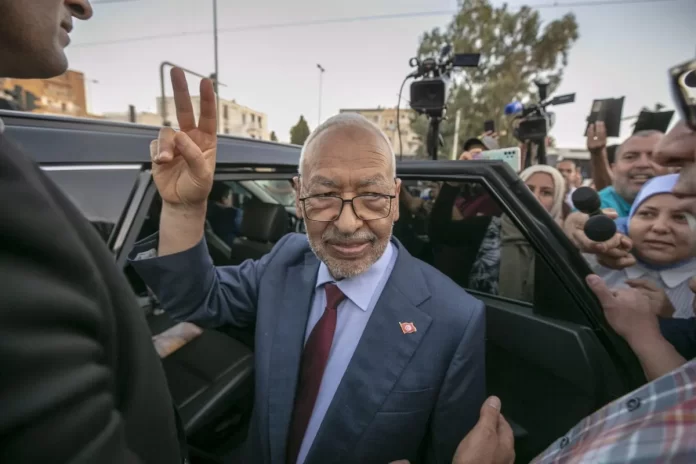20 May 2024: In a stirring letter from prison, Rached Ghannouchi, the leader of Tunisia’s Ennahda party, has unequivocally refused to appear before a judge, asserting both his and his party’s innocence amidst a series of politically motivated charges.
On May 17, 2024, the Tunisian Court of Appeal upheld a three-year prison sentence against Rached Ghannouchi and his son-in-law, former Foreign Minister Rafik Abdel Salam, in a case known as the “lobbying case.” The court found them guilty of charges related to foreign financing, issuing a ruling that includes a substantial fine of over $1 million, allegedly the value of the funds received from abroad. Habib Tarkhani, the spokesperson for the Court of Appeal, confirmed the sentences, stating that the case involved serious accusations of foreign financing.
Additionally, the indictment team responsible for examining terrorism cases at the Court of Appeal decided to refer 12 defendants, including several Ennahda leaders, to the judiciary on terrorism-related charges. These individuals include Vice-President of the Ennahda Movement Munther Al-Wanissi, Rafik Abdel Salam, Sheherazade Okasha, Ahmed Qaloul, Tariq Bou Bahri, Reda Idris, Moaz Al-Khereiji, Maher Zaid, Muhammad Fathi Al-Ayadi, and Muhammad Al-Samiti. Most of these defendants are currently abroad.
In his letter, penned on the summons notice sent to him by the judge, Ghannouchi expresses his deep-seated conviction of his innocence and his regret at not being able to defend himself in court. He begins by acknowledging the respect due to the judicial office but immediately underscores his refusal to appear. “How I wish I had been able to do that because I am completely convinced of my innocence and the party’s innocence of clandestine work and violence. I have spent half a century absorbing from the noble path of Islam with its justice and mercy,” he wrote.
Ghannouchi’s words reflect a profound disillusionment with the Tunisian judicial system, which he claims is heavily influenced by the highest authorities in the country. He pointed out that judges who acquit defendants in politically sensitive cases are often themselves accused of complicity. “The matter has gone beyond threats to action and the trial of dozens of elites and the best judges in Tunisia,” he wrote.
The letter suggests that Ghannouchi’s refusal to attend court proceedings is an attempt to shield the judges from further threats and coercion. He emphasized that his trial is a political issue involving the most significant party in the country, accusing the judiciary of being used for political objectives. “We are facing an issue that affects justice, a political issue that concerns the most important party in the country, in which the judiciary is used for political purposes and objectives,” he noted.
Ghannouchi concluded his letter with a reflection on the current state of justice in Tunisia, expressing a desire not to contribute to the pressures faced by judges. “Therefore, I find myself compelled not to attend in order to spare you the embarrassment and not contribute to the pressure and threats to which the judges may be exposed if they rule fairly and acquit me and my party.”
The broader political and judicial landscape in Tunisia has been marked by significant tensions, with Ghannouchi completing a full year of detention last April amidst calls from a popular trade union movement for his release and that of other detainees. The accusations against him and his party have been consistently framed by Ennahda and its supporters as politically motivated, aimed at undermining the most significant opposition force in Tunisia.
Ghannouchi’s letter from Mornaguia prison underscores these tensions and brings to light the serious accusations of judicial manipulation and political persecution in Tunisia. His decision not to attend court proceedings stands as a powerful statement against what he and his supporters perceive as a deeply compromised legal system.




